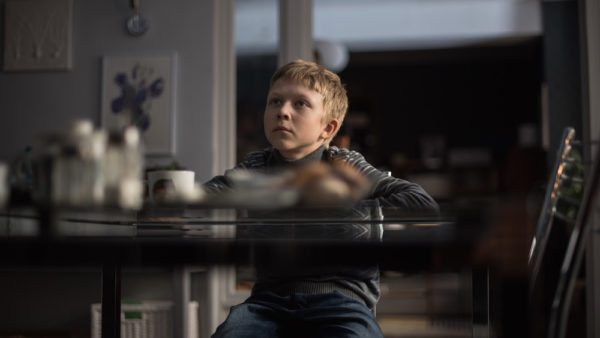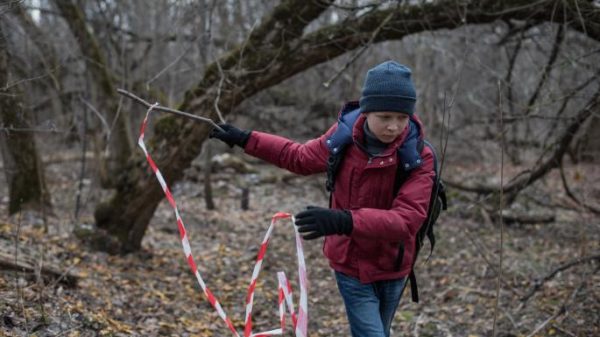Loveless, 2017.
Directed by Andrey Zvyagintsev.
Starring Maryana Spivak, Aleksey Rozin, Varvara Shmykova, Matvey Novikov, Daria Pisareva, and Yanina Hope.
SYNOPSIS:
A couple going through a divorce must team up to find their son who has disappeared during one of their bitter arguments.
Loveless is detached and bleak, a window into the lives of a couple near the finish line of a nasty divorce where each partner already has a new flame. The issue is that their 12-year-old son Alexei is neglected and ignored to the point where the depressed lad winds up missing (either he ran away or something much more sinister has happened). Then again, both Zhenya and Boris are such selfish and one track minded individuals that it’s hard to imagine a time when the boy ever did feel truly loved. Yet, director Andrey Zvyagintsev (most known for his previous accolade garnering feature Leviathan) consistently finds ways to empathize the parents’ flaws by indulging in quiet moments pulling back from their egos where they display good relationship qualities in their new lives.
It renders them not entirely worth hating as they try to function like calm human beings while searching together for Alexei, also adding another layer to the devastation of the missing child’s case. Early on, Zhenya and Boris (defeatedly played with emotional disconnection by Zvyagintsev regular Aleksey Rozin) enter a heated argument regarding false promises and their failed marriage (well, Zhenya does most of the shouting and yelling as relative newcomer Maryana Spivak plays her with bitter rage, frequently lashing out and starting fights with Boris as, to my guesswork, a way to cope with her own frustrations and unhappiness of her life’s current trajectory) where, unknowingly, Alexei is able to hear every insult.
His pain and tears are earnest to the point of disarmingly horrifying. With acting this calculated, it’s hard to hold it against Zvyagintsev for never expanding on the character following that sadness. It doesn’t matter what happened or how much we loathe being around his parents (their negative personality traits far outweigh the positives), the narrative instantly goes up a notch in its engagement levels with the desire for Alexei to be found safe and relocated anywhere but here. Fascinatingly, free-work volunteers of a search and rescue group are enlisted to aid the investigation, who may care about the kid more than these two immature dolts incapable of amicably sorting out their mess. Furthermore, it’s low-key inspiring witnessing a community band together for an admirable cause.
Boris already has another woman pregnant, under the impression that this time will be different since the mother-to-be is actually excited about the prospect of nurturing, while Zhenya enjoys the company of a much older man who likewise has no interest in adding a third wheel. The only thing everyone shares is their affinity for sexual activity, which is fairly gratuitous, but shows where their concerns lie. I have no clue who is even supposed to be taking care of Alexei; his parents leave seemingly every night to be with their fresh significant other.
Even if it becomes impossible for some viewers to want to further analyze these people considering their terrible nature, Zvyagintsev’s film boasts some beautiful photography, almost too excessive lengths, but it helps whenever scenes are dragging on. Abandoned and dilapidated buildings contain water leaks and are simply hideous in presentation, the search and rescue team is captured from impressive wide-angle shots splitting up looking through a forest, and even car rides are composed with style usually fixated on facial expressions of characters reflected in the mirror. It would have been nice if these driving segments weren’t littered with distracting political conversations over the radio (admittedly, there is a bigger picture painted comparing important issues in Russia with the investigation of one missing child); it’s superfluous and eye-rolling.
There are more instances where it feels as if Loveless could cut right to the chase without losing much of its intricate characterizations, which is the film’s only true glaring flaw. It’s a 2+ hour feature that could be 100 minutes once you cut down on the fucking and overly long office environment discussions about what happens to employees that get divorced from their spouses when working under an extremely Christian boss. The point that Boris is a terrible person only worried about the future of his social status (and not how anything impacts his wife) shouldn’t take however long it does to make.
For those willing to have their patience tested, Loveless does serve up a provocative examination of relationships and how toxicity can affect those closest to them. There’s a biting sequence where Zhenya visits her cruel mother, coming away not with hatred, but the realization that she was right about certain aspects. It’s not necessarily a question of whether the child will be found, but will these people continue to ruin the lives of others. Just like the gray, colorless visual palette, Loveless doesn’t offer much optimism. The ending is actually downright depressing.
Flickering Myth Rating – Film: ★ ★ ★ ★ / Movie: ★ ★ ★ ★
Robert Kojder is a member of the Chicago Film Critics Association and the Flickering Myth Reviews Editor. Check here for new reviews, friend me on Facebook, follow my Twitter or Letterboxd, check out my personal non-Flickering Myth affiliated Patreon, or email me at MetalGearSolid719@gmail.com
SUPPORT FLICKERING MYTH: Help us keep the lights on by backing us on Patreon















